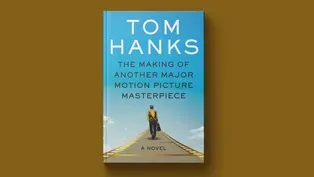
Brooks and Capehart on border policy, debt ceiling debate
Clip: 5/12/2023 | 10m 24sVideo has Closed Captions
Brooks and Capehart on U.S. border policy and debt ceiling negotiations
New York Times columnist David Brooks and Washington Post associate editor Jonathan Capehart join Amna Nawaz to discuss the week in politics, including the end of the Title 42 border policy, former President Trump found liable for sexual abuse and the ongoing negotiations over the debt ceiling.
Problems with Closed Captions? Closed Captioning Feedback
Problems with Closed Captions? Closed Captioning Feedback
Major corporate funding for the PBS News Hour is provided by BDO, BNSF, Consumer Cellular, American Cruise Lines, and Raymond James. Funding for the PBS NewsHour Weekend is provided by...

Brooks and Capehart on border policy, debt ceiling debate
Clip: 5/12/2023 | 10m 24sVideo has Closed Captions
New York Times columnist David Brooks and Washington Post associate editor Jonathan Capehart join Amna Nawaz to discuss the week in politics, including the end of the Title 42 border policy, former President Trump found liable for sexual abuse and the ongoing negotiations over the debt ceiling.
Problems with Closed Captions? Closed Captioning Feedback
How to Watch PBS News Hour
PBS News Hour is available to stream on pbs.org and the free PBS App, available on iPhone, Apple TV, Android TV, Android smartphones, Amazon Fire TV, Amazon Fire Tablet, Roku, Samsung Smart TV, and Vizio.
Providing Support for PBS.org
Learn Moreabout PBS online sponsorshipAMNA NAWAZ: Well, this week brought us several major political stories, including the end of a controversial border policy, former President Donald Trump found liable for sexual abuse, and ongoing negotiations over the debt ceiling.
To discuss all of this, we turn to the analysis of Brooks and Capehart.
That is New York Times columnist David Brooks and Jonathan Capehart, associated editor for The Washington Post.
Welcome to you both.
Good to see you.
JONATHAN CAPEHART: Hey, Amna.
DAVID BROOKS: Good to be with you.
AMNA NAWAZ: We're talking about immigration once again.
Focus is back on the U.S. Southern border.
David, as you know, we saw from the report earlier, folks are saying, as Title 42 ends, it's crowded, but not chaotic.
Still, numbers have been ticking up.
They're at very high daily averages.
And, as Secretary Mayorkas has said, they continue to work within the confines of a system that has been outdated and underfunded for years.
Did it have to be this way?
DAVID BROOKS: Well, given our political system, for sure, yes.
(LAUGHTER) DAVID BROOKS: I think a couple of things.
One, I'm glad they're getting rid of Title 42.
It's insane to have an immigration policy that really pretends to be a health care policy or vice versa.
And, basically, we have to define what asylum is.
And so there are lots of people who are fleeing persecution.
Asylum -- that's what the asylum bill is meant for.
But there are lots of people who are just seeking a better life, and that's a perfectly legitimate reason to try to immigrate here, but you can't -- then they're trying to use the asylum system to get in.
And that's one of the many ways our system has broken down.
But I'm really -- you look at what's happened in Europe, around the world, and in this country.
Donald Trump would not have been president without chaos at the border, in my view.
And the far right people in -- across Europe would not be doing so well politically without chaos at the border.
So it doesn't matter what level we have.
I have preferences at a level, but, mostly, Americans need to have a sense that somebody's controlling this thing, and, right now, they don't have that sense.
AMNA NAWAZ: Jonathan, what do you make as you're watching this?
JONATHAN CAPEHART: Well, to pick up on what David was saying, that people using the asylum system -- why?
And part of the reason why is that the American immigration system, there's such a backlog through the legal channels, the proper channels, that people are finding any and every way possible to come into this country.
So, until Congress gets its act together and do something, comprehensive immigration reform, which, the last time, if memory serves, that we got anywhere near doing something was when the Senate passed its bipartisan Gang of Eight immigration reform bill out of the Senate.
And then it stalled in the House in 2014.
And we have not seen anything like that since.
And this is one of those situations where, if Washington were working properly, if the country were in a different place, this is the situation where you would have another Gang of Eight, gang of 12, just a gang, a congressional gang, getting in a room and hashing out, OK, how do we fix this now?
This is our opportunity.
And, instead, it doesn't seem like Congress is going to do anything.
AMNA NAWAZ: But does it surprise you, though, to see the Biden administration move further right on this?
I mean, the fact that they're being sued by both progressives and conservatives about their immigration policies, what does that say to you about this moment?
JONATHAN CAPEHART: It says that everything's broken.
It is broken.
I should correct myself.
The House did pass an immigration bill.
AMNA NAWAZ: They did.
JONATHAN CAPEHART: But it's not going anywhere in the Senate.
AMNA NAWAZ: So, to that point, David, they knew that bill would be dead on arrival in the Senate.
DAVID BROOKS: Right.
AMNA NAWAZ: Where's the incentive to compromise?
DAVID BROOKS: Well, first, on the brokenness, I mean, the Biden administration, I think, is shifting toward a more mainstream position.
You remember that Democratic presidential primary debate in 2020, when, should we decriminalize the border?
And all those hands went up, but not Biden's.
But that was a moment when the party was really not in the mainstream, because people want immigration, but they also want some control.
I'm going to be on the irrational side of tiny hints of optimism.
You know, the House -- the House passes this bill, and then, in the Senate, you get Kyrsten Sinema and Thommy Tillis, two senators saying, yes, it's a starting point.
And then you get Dick Durbin, Democrat, saying - - he wouldn't say it's a starting point, but he said it's hopeful.
Schumer is active.
There are a lot of people suddenly who are active.
And so I guess one thing, we have been covering this and people have been trying to push immigration reform as comprehensive immigration reform, where it's one big bill, everybody gets a piece.
We have been trying that for 30 years.
Maybe we should try something more modest, just take a step.
And with all the desire -- there's pent-up desire to do something, but that big thing looks pretty hairy and messy.
AMNA NAWAZ: We're surely going to be talking about this, I think, in 2024 quite a bit.
And the front-runner on the Republican side for that race right now remains former President Donald Trump, who was also in the headlines quite a bit.
Earlier in the week, he was found liable of sexually abusing and defaming E. Jean Carroll.
He also took part in a live CNN town hall, where he continued to lie about the 2020 election.
He mocked Carroll and I think, it's fair to say, offered a real clear preview of what we're going to see for the next year-and-a-half.
Jonathan, I know you were watching all of this unfold.
Is this what we're in for... (CROSSTALK) JONATHAN CAPEHART: Yes.
Oh, absolutely.
This is what we're in for.
But I wasn't surprised.
I have watched this Trump rerun since June 16, 2015, when he announced his presidential campaign.
But what was so horrific about that town hall was the reaction of the audience, the reaction of the audience when it came to talking about January 6, especially the reaction of the audience as he continued to defame E. Jean Carroll and to question the jury, a jury of his peers who found him liable for sexual abuse.
There was just an ugliness and rawness about that reaction that I think probably helps him in the primary.
But, God almighty, I hope it hurts him in the general, if he is indeed the Republican nominee, because that cannot be.
America cannot go down that road again.
AMNA NAWAZ: Is granting him a live platform a mistake or a bad idea?
DAVID BROOKS: No, I don't think so.
He's in -- Washington Post poll, he has a healthy lead on Joe Biden.
By a huge margin, people prefer his economic policies to Joe Biden's.
He is the number one or two most important political figure in the country right now.
We in the media don't get decide who we cover.
Basically, the American people get to decide, and they did get to decide by their votes and their preferences in polling.
And so we cover major figures.
Now, there's ways to cover and ways not to cover, but, in my view, it would be disastrous if we appointed ourselves the censors or the determiners of who gets covered in this country.
And one of the reasons Donald Trump is popular is because people think people in our business are arrogant.
And, to me, that would be an arrogant move to say, no, we're just not going to cover that guy.
JONATHAN CAPEHART: I mean, let's be clear.
Donald Trump isn't popular because folks see that the media is arrogant.
Donald Trump is popular because he scratches that very raw, emotional and ugly itch that is there within the American -- within the American populace, where he -- if I read one more time of someone saying, I like Donald Trump because he says what we're thinking, if that's the case, then those are some really ugly thoughts.
AMNA NAWAZ: I know we're going to be talking about this for several months ahead, so I want to turn now to another looming issue, which is, of course, the talks over the debt ceiling.
There is no clear path in sight right now, but the talks do continue.
So do you at least take that as a sign of progress?
Is there going to be a deal in time?
DAVID BROOKS: Yes, I'm on the tippy bottom end of cautiously optimistic.
(LAUGHTER) AMNA NAWAZ: Tippy bottom is a new phrase, by the way.
(LAUGHTER) DAVID BROOKS: And so, you know, they're talking.
The staffs are talking.
They postponed the meeting.
That suggests to me there is talking.
They seem to have some agreement at least what they're going to talk about, spending cuts and timing and things like that.
We have had dozens of debt ceiling crises - - or not crises, but where we had to raise a debt ceiling.
And in the majority of the recent ones, they attached some budget cuts to it or they attached some debt reduction.
And so -- and in every single one of those times, they did it without a crisis.
Now, clearly, it's a hairier situation than any of those dozens before.
But the fact that history suggests that they did it how many dozens of times without sending the country and the world into global chaos, that puts me at the tippy bottom.
AMNA NAWAZ: Is history a guide?
Are you at the tippy bottom of optimism?
Are you... JONATHAN CAPEHART: I think I'm there with David being optimistic that the staffs are meeting.
The staffs met on Tuesday, Wednesday, Thursday.
They met today.
And so if the staffs are meeting, then that's a great sign.
But this is one scary ride that we are on.
I don't see -- here's what I would love to see happen.
Great that the staffs are talking and that they're talking about budget cuts,but it has to be part of the appropriations process.
This needs to be twin -- dual-track, raise the debt ceiling cleanly, and then keep having those conversations about what those budget - - the spending cuts should be.
That's the way it should be done.
And my fingers are crossed that, in the end, we pull this plane out of the nosedive with an announcement that that's exactly what's going to happen.
AMNA NAWAZ: Is that enough for Speaker McCarthy?
He traded away a lot to get to the speakership.
Can he come back to this conference with anything short of a promise of spending cuts?
DAVID BROOKS: Oh, he's going to get spending cuts.
But the question is, how big will they be?
And if you look at what happened in '90, '93 '97, they did sort of that.
They said, we're going to raise the debt ceiling, but we're going to have a big omnibus bill.
And, in those cases, they actually got to a balanced budget we're not going to get to.
But he -- I think Biden administration knows they're going to have to cut some spending, as they should.
We're just spending too much money right now.
AMNA NAWAZ: So where do you hope this ends up now?
You think there's two paths ahead, and that's what -- that leaves both sides with a win they can walk away with?
JONATHAN CAPEHART: I said what I said.
(LAUGHTER) JONATHAN CAPEHART: Yes, the dual track gives each one -- gets to yes for each camp.
They just have to do it.
AMNA NAWAZ: OK, we will watch.
We will wait.
We will have you back and see if you're right.
(LAUGHTER) AMNA NAWAZ: That's the real test.
Jonathan Capehart, David Brooks, always good to see you.
Thank you.
DAVID BROOKS: Thank you.
JONATHAN CAPEHART: Thanks, Amna.
Border stays calm but new asylum policies lead to confusion
Video has Closed Captions
Clip: 5/12/2023 | 6m 27s | Southern border stays calm but confusion builds as new asylum policies take effect (6m 27s)
Man who put Jordan Neely in fatal chokehold released on bond
Video has Closed Captions
Clip: 5/12/2023 | 7m 48s | Man who put Jordan Neely in fatal chokehold released on bond after manslaughter arrest (7m 48s)
Public health questions remain as COVID emergency ends
Video has Closed Captions
Clip: 5/12/2023 | 8m 50s | Public health questions remain as COVID emergency ends (8m 50s)
Tom Hanks discusses his debut novel
Video has Closed Captions
Clip: 5/12/2023 | 7m 55s | Tom Hanks on his debut novel, 'The Making of Another Major Motion Picture Masterpiece' (7m 55s)
Turkey prepares for election as Erdogan tries to hold power
Video has Closed Captions
Clip: 5/12/2023 | 6m 2s | Turkey prepares for consequential election as Erdogan struggles to maintain power (6m 2s)
Providing Support for PBS.org
Learn Moreabout PBS online sponsorshipSupport for PBS provided by:
Major corporate funding for the PBS News Hour is provided by BDO, BNSF, Consumer Cellular, American Cruise Lines, and Raymond James. Funding for the PBS NewsHour Weekend is provided by...















